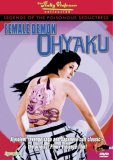| Reviews & Columns |
|
Reviews DVD TV on DVD Blu-ray 4K UHD International DVDs In Theaters Reviews by Studio Video Games Features Collector Series DVDs Easter Egg Database Interviews DVD Talk Radio Feature Articles Columns Anime Talk DVD Savant Horror DVDs The M.O.D. Squad Art House HD Talk Silent DVD
|
DVD Talk Forum |
|
|
| Resources |
|
DVD Price Search Customer Service #'s RCE Info Links |
|
Columns
|
|
|
Legends of the Poisonous Seductress: Female Demon Ohyaku
I couldn't find any original Japanese posters, so here's a recent picture of star Junko Miyazono, still active on Japanese television
Within its first few minutes, the film's story and its characters are established in the broadest of strokes. Ohyaku (Junko Miyazono) is an entertainer specializing in a high-wire act where horny men, watching from below, try to glimpse her pubic region through the open bottom of her kimono. (She most definitely is not, as the IMDb claims, a "female samurai.") She's also a grifter conning lustful men out of their money, but quick to give away her stolen loot to the poor.
She falls in with Shinkuro (Kunio Murai), a thief plotting to steal raw gold, not so much for personal gain but rather to punish bureaucrats exploiting the poor (!). Shin-san is betrayed, however, by an ambitious minor accountant and soon the evil Sengoku (Koji Nanbara) has the pair locked away in his torture chamber, where he hangs Ohyaku by the hair, nearly pealing off her scalp while dangling her precariously above a kind of hot plate. Shin-san reveals the location of the hidden gold to spare her, but is immediately beheaded as Ohyaku looks on in horror.
Sengoku exiles her to the poisonous gold mines of Sado Island, and there she encounters a bisexual tattoo artist, Omon (Yuriko Mishima), obsessed with inking Ohyaku's "perfect" skin while the condemned woman plots her escape.
Films like Female Demon Ohyaku walk their own, tightrope-thin line between empowering women protagonists who make men pay dearly for the injustices done to them and blatant misogynistic exploitation. This critic would argue that a tiny handful of these pictures, notably Female Convict Scorpion - Jailhouse 41 (1972), could genuinely be regarded as feminist (and artful) films; most, however, try to have it both ways. Here, as is often the case, while we're sympathetic to Ohyaku's plight we're also supposed to be titillated by her sexual allure even as she's being assaulted. Then again, the film is so elementary in its scripting and naively desirous to provide visceral entertainment that it's almost innocently charming.
"Pinky violence" began to emerge in the late-1960s for several reasons: a slackening of censorship restrictions, the popularity of underground "pink" films and the decline at the box office of mainstream domestic studio pictures. This being one of the earliest examples it's more restrained than most. Except for a brief glimpse at Ohyaku's behind there's only the hint of nudity here and there, though the violence is fairly graphic compared to western world films being made at the same time. The torture scenes are pretty disturbing, particularly when Ohayku's scalp begins bleeding down her forehead as she hangs helplessly above the hot plate-like torture device threatening to grill her alive.
The film was directed by Yoshihiro Ishikawa, a former assistant to Nobuo Nakagawa (who'd direct the second and third films in the series). Ishikawa had the disadvantage of being promoted to director at Shintoho just as that studio was on the verge of collapse. After disappearing from films for several years, he worked at Toei briefly in 1968 but then stopped making films again. It would seem a safe assumption that Ishikawa worked in television during the interim, then returned to that medium for the rest of his career.
Nonetheless, the picture is well-directed in spite of what was obviously a smaller-than-usual budget. The film has no major stars to speak of save for a brief, largely irrelevant guest appearance by Tomisaburo Wakayama, restrained as a sympathetic gang-leader. Toshiaki Tsushima's score is quite good; at one point it gets very avant-garde with a cue largely composed of music played in reverse, creating an odd but not inappropriate cue.
Video & Audio
Legends of the Poisonous Seductress: Female Demon Ohyaku is presented in a basically flawless 16:9 enhanced transfer. The black and white image is razor sharp and the contrast and bit-rate of this dual-layered, region free disc are superb. The optional English subtitles are very good if overly contemporary at times in their translation. The 2.0 Dolby Digital mono is likewise strong.
Extra Features
Supplements include three pages of liner notes and an audio commentary from genre expert Chris D., who puts the film into historical and cultural perspective while not saying all that much about the film itself; he writes and talks about it with a certain affection, but doesn't seem overly enthused about it, either.
Synapse cover art sleeve for the DVD is great: it's reversible with the original Japanese poster on the other side.
Finally, good looking trailers, also 16:9 enhanced, for all three films in the series are included, and are appropriately subtitled.
Parting Thoughts
Ungainly title aside, Legends of the Poisonous Seductress: Female Demon Ohyaku is an unassuming little period thriller, part chanbara, part "pinky violence" programmer. It's no masterpiece of Japanese cinema, but on its own terms is audaciously entertaining, and the top-tier transfer makes it a pleasure to watch. Recommended.
Film historian Stuart Galbraith IV's most recent essays appear in Criterion's three-disc Seven Samurai DVD and BCI Eclipse's The Quiet Duel. His audio commentary for Invasion of Astro Monster is now available.
|
| Popular Reviews |
| Sponsored Links |
|
|
| Sponsored Links |
|
|
| Release List | Reviews | Shop | Newsletter | Forum | DVD Giveaways | Blu-Ray | Advertise |
|
Copyright 2024 DVDTalk.com All Rights Reserved. Legal Info, Privacy Policy, Terms of Use,
Manage Preferences,
Your Privacy Choices | |||||||














